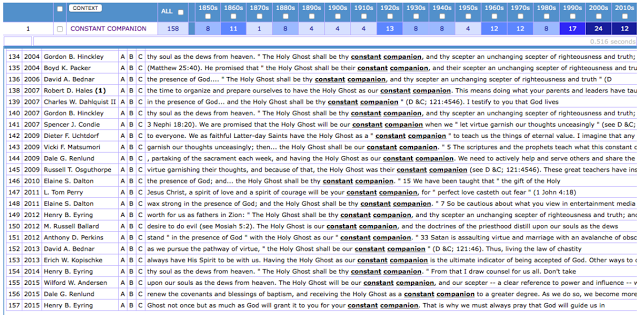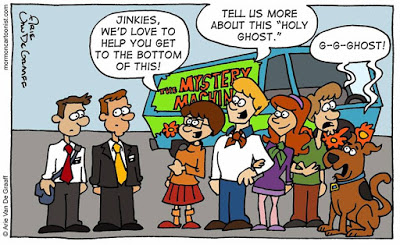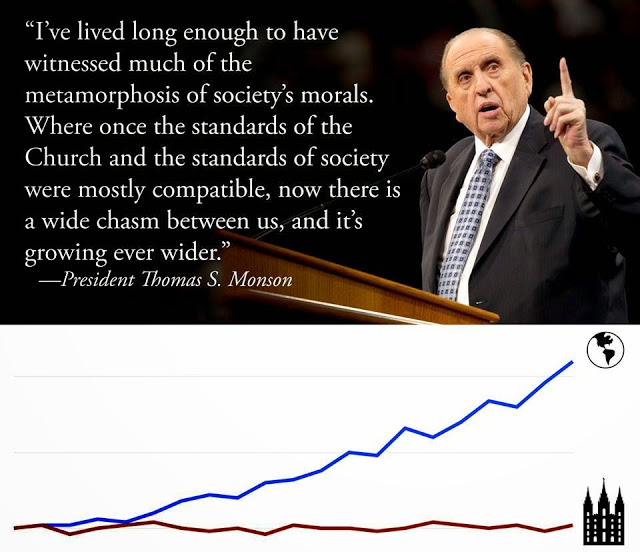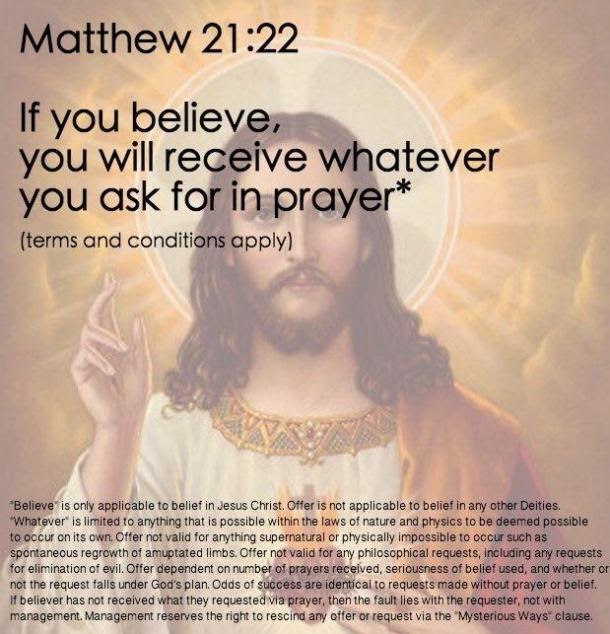“This Is Life Eternal”
John 16–17
LDS manual: here
Purpose
To help readers avoid emotional reasoning.
Reading
In the reading for this lesson, Jesus talks about the Holy Ghost. Since speaking against the Holy Ghost is inexplicably the worst, most unpardonable sin you can commit, I’ll be doing lots of it in this lesson.
Main ideas for this lesson
Holy the Ghost
Some people say that religion fills a need, and I suppose that’s true in a rather sad way: it tries to give people things that life doesn’t. One Christian evangelist revealed one of his angles to me: when he meets people without a strong father figure in their life, he pushes the angle of “God is your father”. Voilá; insta-dad.
Ask: Is that comforting, or just manipulative and awful?
In the same way, people who don’t have a lot of friends might be drawn to the idea of having a “constant companion”, which is how Mormons often describe the Holy Ghost.
Here’s a swag of times where the phrase constant companion has turned up in General Conference. The phrase has been coming up more and more lately. (Try your own searches here.)
And in John, Jesus calls the Holy Ghost “the comforter”. But he mentions another function:
John 14:26 But the Comforter, which is the Holy Ghost, whom the Father will send in my name, he shall teach you all things, and bring all things to your remembrance, whatsoever I have said unto you.
The Holy Ghost will teach you all things? Like as in: all things?
John 16:13 Howbeit when he, the Spirit of truth, is come, he will guide you into all truth: for he shall not speak of himself; but whatsoever he shall hear, that shall he speak: and he will shew you things to come.
Note that there are no caveats as to the kind of truth one can learn from the Holy Ghost. It’s not just spiritual things you can learn by the Spirit; it’s all truth and all things.
We can submit this claim to some skeptical analysis.
Object lesson for class
Here’s a test you can use for comparing the efficacy of the Spirit as a revealer of truth: Have two class members work out the digits of π to some level of precision. One class member gets to use science and technology — math books, web sites, and an ordinary computer — and the other has to use the Spirit. How accurate was each method? I predict the second class member will be right no more than random chance. And it’s no use trying to fudge it and say that the digits of π “aren’t important to your salvation”. Jesus makes no such qualifications in the scripture.
(If this test is not suitable for your class, feel free to substitute any other sort of fact that can be easily verified, and for which answers can be unambiguously right or wrong. Another suggestion is blood type. How accurately can a very spiritual person tell the blood type of various individuals, using revelation? Be sure to have several testing kits on hand.)
There really are no “other ways of knowing”. Science is the only way of knowing. Observing carefully, making predictions, testing them, observing some more — this is the only way we have of knowing something, and even then it’s darn hard. Everything we think is at least a little bit wrong. How could anyone think that communicating with a spirit can do better than science? If it’s hard to get it right with all that careful work, what chance does anyone have mumbling to a ghost?
If you think you know “another way of knowing”, please tell me, because science is hard.
Not only is the Holy Ghost not great at the “revealing truth” part of his job, he’s also terrible at offering companionship. Ask someone their definition of a true friend, and you’re likely to hear that it’s someone who sticks with you through thick and thin, through good times and bad.
Well, the Holy Ghost isn’t that kind of companion. Apparently the Holy Ghost takes off the second you have a lapse in behaviour, or even temperament.
This is not really a dependable companion. Which is why I say: Piss off, little ghost. I have human friends that are more dependable, and a whole lot better at teaching me things.
How to feel the Holy Ghost
Here’s what the LDS manual says about how to feel the Holy Ghost:
To help class members feel and recognize the influence of the Holy Ghost, speak with a few of them in advance, inviting each of them to choose one of the following presentations to do as part of the lesson:
a. Read a favorite scripture passage.
b. Bear testimony.
c. Sing a hymn or Primary song about the Savior.
d. Express love for Heavenly Father and Jesus Christ.
e. Share a spiritual experience (as appropriate).In class, invite class members to describe how they felt during the presentations. Read the statement by President Boyd K. Packer on pages 99–100, and help class members recognize feelings that come from the Holy Ghost. Talk about how you feel when you receive guidance from the Holy Ghost.
What a show: the Gospel Doctrine teacher is supposed to get people to do soppy vulnerable things in front of everyone, and then hope that a collective soppy vulnerable mood ensues. What’s amazing is that it works so often.
After all the things I’ve done in church and all the experiences I’ve had, people still invite me to church hoping that I’ll have some kind of creepy, weepy “spiritual experience”. If I did feel something, that wouldn’t prove the veracity of the church. It would prove that I was capable of emotional reasoning. It would also show that my body can produce oxytocin and other chemicals, which is nice, but hardly evidence for supernatural claims.
Again, from the LDS manual.
President Boyd K. Packer taught: “The Holy Ghost speaks with a voice that you feel more than you hear. It is described as a ‘still small voice.’ And while we speak of ‘listening’ to the whisperings of the Spirit, most often one describes a spiritual prompting by saying, ‘I had a feeling . . .’ . . . Revelation comes as words we feel more than hear” (in Conference Report, Oct. 1994, 77; or Ensign, Nov. 1994, 60).
Emotional reasoning is a bad way of reasoning, but in the LDS Church, ideas verified only by emotion are considered to be the highest form of evidence that there is.
Show the class this video featuring LDS apostle Jeffrey Holland.
“Noting that the sun was going down, we decided that we’d better get back. But we came back to a particular fork in the road, really the only one that at that point was absolutely unrecognizable. I asked my son to pray about which road to take, and he felt strongly that we should go to the right, and I did as well. And we went to the right, and it was a dead end. We went four or five or six hundred yards and it was an absolute dead end, clearly the wrong road.
“Turned around, came back out, took the other road. And clearly the road to the left was the correct road.
“Somewhere along the way, Matt said, ‘Dad, why did we feel, after praying about it, that the right road was the proper one to take, the correct one to take, and it wasn’t?’”
Ask: When the Holy Ghost failed to lead him and his son in the right direction, despite them being sure that they had a confirmation, what should Holland have done if he’d had any intellectual honesty?
Answer: He should have admitted that this method failed in this instance.
Holland continues:
And I said, ‘I think that the Lord, His wish for us there and His answer to our prayer was to get us on the right road as quickly as possible with some reassurance, with some understanding that we were on the right road and we didn’t have to worry about it. And in this case, the easiest way to do that was to let us go 400 yards or 500 yards on the wrong road and very quickly know without a doubt that it was the wrong road and, therefore, with equal certainty, with equal conviction that the other one was the right road.’
Ask: What did Holland do instead to rationalise this failure?
Answer: Claim that the failure was a success! The Lord led them the wrong way to a dead end, so they could be more certain that the right way was indeed right.
This story with its explanation is, quite frankly, astounding. Before Holland gave this talk, if you had a spiritual revelation, you could be pretty sure that what you were told to do was the right thing. Now, post-Holland, you have no idea. Now, a spiritual prompting could be taking you the wrong way, and you won’t know it until you hit a dead end. Is a spiritual prompting to, say, join the Mormon Church leading you to a dead end, and the Lord is helping you be more certain of the right way when you eventually leave?
If you get a hit, your faith is confirmed. if you get a miss, your faith is confirmed more. This is the definition of blind faith. Someone on r/exmormon (can’t find at the moment) said it well: An eye that responds the same to light and darkness is a blind eye. A faith that responds the same way to both confirmation and disconfirmation is blind faith. It is a terrible method. It is just asking to be fooled. We need to make life decisions using good methods and good information.
In the world but not of the world
It’s very common to hear this little aphorism in church, and it’s based more or less on this scripture.
John 17:14 I have given them thy word; and the world hath hated them, because they are not of the world, even as I am not of the world.
From the LDS manual:
How can we, like Jesus and his Apostles, live in the world and be “not of the world”? (John 17:14; see also verses 15–16).
Elder M. Russell Ballard said:“In the Church, we often state the couplet, ‘Be in the world but not of the world.’ As we observe television shows that make profanity, violence, and infidelity commonplace and even glamorous, we often wish we could lock out the world in some way and isolate our families from it all. . . .”
With so much violence in the world, isn’t it kind of sweet and touching that he’s concerned about fictional representations of violence? Anyway.
Ask: What function could this idea serve?
This idea works to create a “scary external world” narrative that will ensure that members get their information, their values, and their positive feels only from church. Not only does this foster a “bunker mentality” that keeps members worried about “the world” and therefore likely to remain in the church orbit, it makes it very difficult for Latter-day Saints to appreciate or even recognise the morality of people in the broader community. And this is important for keeping the brand afloat. If people in “the world” are not uniformly lost and wounded, but have morals similar to — and in some cases, superior to — the rather narrow tribalistic morality taught in the LDS Church, this challenges the idea that Mormon morality is superior and divine.
Additional lesson ideas
I’m Jesus: AMFA
Again, Jesus says that whatever you ask for he’ll give you.
John 16:23 And in that day ye shall ask me nothing. Verily, verily, I say unto you, Whatsoever ye shall ask the Father in my name, he will give it you.
It has occurred to me that perhaps this referred to the disciples only. In that case, it seems kind of strange that they didn’t ask Jesus for some very sensible things, like not being crucified upside-down or not being shot through with arrows. But then the disciples were not the sharpest people ever.






0 Comments
1 Pingback